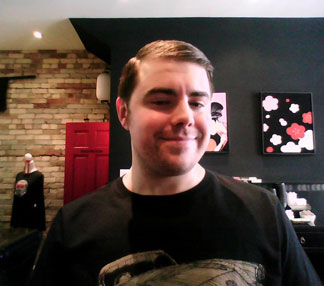
I recently had an interesting experience attending part of a Canadian Stuttering Association board meeting. Although I have been stuttering since around the age of five, I first experienced a meeting of so many people who directly understood what this was like at age twenty-nine.
The only comparable experience prior to that was meeting two fellow stutterers at the Hospital for Sick Children, during my first experience with speech therapy. The setting was, though unintended as such, drastically different from the CSA meeting at Metro Hall in Toronto. The difference between the two places loosely represents a difference in how I see myself as a person who stutters. And the chronologically earlier of the two sets the tone for the isolation I would then go on to feel in this context for most of my life.
As I mentioned before, I came into stuttering at around age five. No one understood why, and I had no explanation when asked. It was just a thing about me to be accepted, which was ignored at the most polite of times. I had an internal sense of difference, and others may have had their feelings about me being different.
I had an internal sense of difference, and others may have had their feelings about me being different.Then came the idea that the way I talked was a condition, and it could be treated. My parents understood that there was no “cure” I could drink, but I could be given a regimen of exercises which might help me grow out of it. To facilitate this, I was driven from Woodbridge to Toronto on therapy days during my normal lunch and recess time.
Speech therapy
There was some misunderstanding with other children: nobody had heard of speech therapy. Some thought I had fabricated its existence in order to explain why I was specially driven away from school and returned with fast food for lunch. However, this is a side note. Children have social challenges to begin with, about fitting in, and other children can be cruel, etc. What I want to underscore here is that my new way of thinking about stuttering was entirely clinical. Even if nobody explicitly put it in these terms, this approximates what was going through my mind:
- I am broken or damaged in some way; I am set apart from others in a negative way.
- If I lapse back into stuttering, it is a matter of fault/responsibility. I must not have practiced enough for that to happen.
What I didn't have at that time was a friend going through a similar experience directly. I couldn't really think of an adult in my life who had lived with what I was living with and succeeded, even though I was told quite often about celebrities and well known people whom I never heard sound like me. The idea that I could continue to speak the way I do was a frightening specter of imagined future problems, where potential future employers might think other things must be wrong with me of which different speech is merely a warning sign. I had a lot to feel anxious about. While there could be other factors in the development of my social performance anxiety, and social anxiety in general, the two points above and the general sense of doom sure didn't help.
Finding answers
I began to chip away at some of the misinformation about stuttering that had clouded my mind It was only after graduating from university that I began a more intense online search for information, and began to chip away at some of the misinformation that had clouded my mind. Out there in the wider world, there were people who understood my experience. There were summer camps—oh, why didn't I ever find one like it when I was a kid?! And then there was the day where, heart racing and feeling like it would explode, I dared stand on a stage for the first time to sing a song I had heard often on cassette tape in my youth, Nights in White Satin. That day, I learned I could sing a song that I know really well without encountering the same difficulties that I have with speech, even though the experience of being on a stage in front of many staring people is precisely what exacerbates my difficulties (e.g. when performing book chapter readings). Somehow, even having performed at children's concerts for my school, that had never quite worked before I was an adult.
It was that prolonged journey of self-discovery which led me to reach out to Pam Mertz and stuttering bloggers when I finally decided to self-publish my first novel. It's been a long, slow process of realizing personal truths, and changing the way I see myself.
As I listened in on this collection of grown adults in Metro Hall, who each have their unique experience with this thing I'm certainly not alone in experiencing, and who were setting out their suggestions and goals about how to be there for people like me, I didn't quite know how to feel. I suppose what I feel now is hope. I hope that Canada is moving toward better informed families, happy children who won't have to feel quite the isolation that I felt, and happy adults who can share their stories of triumph in positive environments.
Dylan Madeley is a copy editor and regular contributor for Auxiliary Magazine, an alternative fashion music and lifestyle magazine. He is a regular participant in National Novel Writing Month, and his first published fantasy fiction novel, The Gift-Knight's Quest, is set to be released May 28 via Troubador Publishing.
